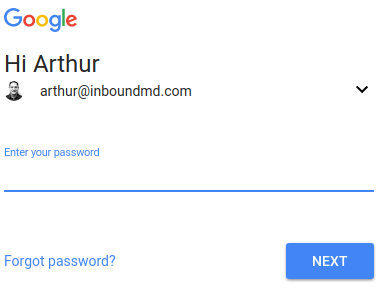

- #Google chrome com sign in how to#
- #Google chrome com sign in full#
- #Google chrome com sign in android#
- #Google chrome com sign in password#
This change plays into that narrative, regardless of Google’s “true motivations.” The company is now on the receiving end of a lot of negative coverage and commentary about privacy, as is Facebook. More data is useful for personalization of ad targeting, but these kinds of changes come with risks for Google. Google has been in a kind of arms race with Facebook to capture and understand user data for targeting, remarketing and attribution.

Google would need to do much more communication around the login and sync changes with end users before they can be confident that they’ve obtained consent to receive browsing data. Users typically just “agree” and “authorize” without reading policies or terms in order to get on with whatever they’re seeking to do. However, Green’s point about users not fully understanding what’s going on and potentially unwittingly authorizing their browsing data to be sent to Google is valid. So the automatic sign-in and sync are different, according to the company. Google is saying that the browser history data doesn’t go to Google automatically and that users must opt in to have that happen. Adrienne Porter Felt September 24, 2018 This does NOT mean that Chrome is automatically sending your browsing history to your Google account! 1/ Chrome desktop now tells you that you’re “signed in” whenever you’re signed in to a Google website. Theyre securely stored in your Google Account and available across all.
#Google chrome com sign in android#
Hi all, I want to share more info about recent changes to Chrome sign-in. Manage your saved passwords in Android or Chrome. Google: ‘We don’t automatically get browsing data’: Asked to comment on Green’s post and the issue more generally, Google pointed to a tweet from Chrome engineer Adrienne Porter Felt: Just tap your profile picture and follow the link to Manage your Google Account. You’re never more than a tap away from your data and settings. Just sign into your account to access your preferences, privacy and personalization controls from any device. Whether intentional or not, it has the effect of making it easy for people to activate sync without knowing it, or to think they’re already syncing and thus there’s no additional cost to increasing Google’s access to their data. Your Google Account makes every service you use personalized to you. In short, Google has transformed the question of consenting to data upload from something affirmative that I actually had to put effort into - entering my Google credentials and signing into Chrome - into something I can now do with a single accidental click.
#Google chrome com sign in full#
One of Green’s primary concerns is that Google will now receive users’ browsing histories without their full understanding and consent: This offers convenience to end users but has also raised privacy concerns. Chrome is the most widely used browser in the world with a nearly 60 percent market share globally and about 50 percent in the US.Ī ‘forced login?’ Some people are upset by the Chrome 69 change, calling it a “forced login.” It was first discussed on Hacker News. Johns Hopkins professor and cryptography expert Matthew Green has also raised privacy and trust concerns about the change on his blog. It has a new sync feature that connects the browser to other Google properties such as Gmail or YouTube, so when you log into Gmail, you’re automatically logged into Chrome. You can also turn Auto sign-in off if you want to provide confirmation before signing in.Recently, Google released a new version of its Chrome browser ( Chrome 69). You can automatically sign in to sites and apps using info you’ve saved. Under "Never Saved," see the websites that will never offer to save passwords.
#Google chrome com sign in how to#
If you don’t see your Google Account, learn how to turn sync on in Chrome.You can view or manage the sites that will never offer to save passwords:
#Google chrome com sign in password#
You won't see an offer to save that password again. When you're prompted to save a password, select Never. You can choose to never save passwords for specific sites. Manage offers to save passwords for specific sites or apps



 0 kommentar(er)
0 kommentar(er)
